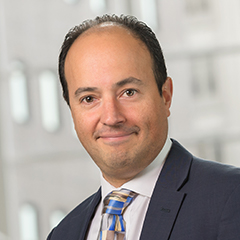On May 19th, 2021 the Duke-CZI NDCN community gathered virtually for a discussion of the book Brain Fables: The Hidden History of Neurodegenerative Diseases and a Blueprint to Conquer Them. We were joined by both authors of the book, Dr. Alberto Espay and Benjamin Stecher, who shared their motivations for writing the book and highlighted their key takeaways that will transform the neurodegenerative disease field in the 21st century. Duke-CZI NDCN members were able to ask questions to both Alberto and Ben to dig into the details of how we can all take part in this next step forward in Neurodegeneration.
 Dr. Alberto Espay is professor and endowed chair of the University of Cincinnati James J. and Joan A. Gardner Family Center for Parkinson’s Disease and Movement Disorders. He has published over 250 peer-reviewed research articles and book chapters, including 5 books. His research efforts have focused on the measurement of motor and behavioral phenomena in—and clinical trials for—Parkinson’s disease as well as in the understanding and management of functional movement disorders. He currently serves the International Parkinson and Movement Disorders Society as chair of the Task Force on Technology and Secretary of its Pan-American Section. With colleagues at the University of Cincinnati, he recently launched the first biomarker study of aging (CCBPstudy.com), designed to match people with neurodegenerative disorders to available therapies from which they are most biologically suitable to benefit.
Dr. Alberto Espay is professor and endowed chair of the University of Cincinnati James J. and Joan A. Gardner Family Center for Parkinson’s Disease and Movement Disorders. He has published over 250 peer-reviewed research articles and book chapters, including 5 books. His research efforts have focused on the measurement of motor and behavioral phenomena in—and clinical trials for—Parkinson’s disease as well as in the understanding and management of functional movement disorders. He currently serves the International Parkinson and Movement Disorders Society as chair of the Task Force on Technology and Secretary of its Pan-American Section. With colleagues at the University of Cincinnati, he recently launched the first biomarker study of aging (CCBPstudy.com), designed to match people with neurodegenerative disorders to available therapies from which they are most biologically suitable to benefit.

Benjamin Stecher was born in Nairobi, Kenya but grew up just outside Toronto, Canada. He studied history and philosophy at the University of Guelph, and spent most of the next decade living and working in East Asia as an education consultant.
All that changed when, at 29 years old, Benjamin was diagnosed with Parkinson’s disease. The promising future he had been building towards was suddenly replaced by uncertainty and despair. As his disease progressed, he realized that he needed to come back home to learn how to better manage his disease.
But, as he started visiting labs and attending conferences, he soon found himself enthralled by the rampant pace at which biomedical science has progressed in the 21st century. He spent the next couple of years visiting research centers and pharmaceutical companies to learn from the top minds in the field all that he could about this disease and what therapies were on the horizon.
He now speaks regularly at academic centers and biotech companies on issues related to neurodegenerative diseases, research advocacy and healthcare. He is also the founder of Tomorrow Edition (tmrwedition.com), co-author of the recently released book Brain Fables, and a patient advisor to several organizations including the Toronto Western Hospital Movement Disorder Clinic and the Cincinnati Cohort Biomarker Program.